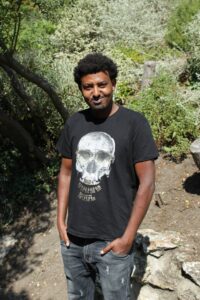Meet Our Wadsworth International Fellows: Blade Engda Redae
 This month Wenner-Gren is excited to spotlight Blade Engda Redae who recently received a Wadsworth International Fellowship to continue his training in archaeology at the University of Poitiers, France, supervised by Dr. Jean-Renaud Boisserie.
This month Wenner-Gren is excited to spotlight Blade Engda Redae who recently received a Wadsworth International Fellowship to continue his training in archaeology at the University of Poitiers, France, supervised by Dr. Jean-Renaud Boisserie.
I completed my BA degree in Archaeology in 2012 from Addis Ababa University, and have been working in the Authority for Research and Conservation of Cultural Heritage (ARCCH) as an archaeology and paleontology expert since 2013. My first experience at the Omo paleoanthropological site was during the 2014 Omo Group Research Expedition (OGRE) field season. In 2017, I had the opportunity to train in various laboratory activities (such as micro-wear sampling and curation) on the Shungura collections as part of my internship. I have also been participating in various paleontological and archaeological research projects including in the Afar Rift and Turkana Basin.
In 2016, I was sponsored by the Erasmus Mundus program in the International Master in Quaternary and Prehistory (IMQP) during the academic year of 2017/2018. I am currently finalizing the program through the completion of my Masters project on taphonomic and zooarchaeological assessments of the fossil faunal assemblages from the Plio-Pleistocene Shungura deposits. This study clearly demonstrates the great potential of the site for reconstructing a more complete picture of the hominin dietary and behavioral ecology of the Plio-Pleistocene Shungura, and gaining a better understanding of community dynamics, ecology and hominid behaviors.
My PhD topic aims to investigate the ecology and taphonomy of vertebrate assemblages in the context of the Shungura Oldowan industry (ca. 2.3 Ma) with comparisons throughout the Shungura sequence. The objectives are to reconstruct the environmental context of the Shungura Oldowan industry, test patterns of hominid habitat exploitation and understand the purpose of making stone tools.
My topic is fully integrated within the OGRE and hosted by the laboratory PALEVOPRIM (University of Poitiers and CNRS) where I plan to pursue my PhD in collaboration with the National Museum of Natural History (Paris).
Finally, my goal is not only to achieve a scientific career in paleoanthropology, but also to return to Ethiopia in order to develop scientific research and strengthen the field of human evolution in the country, where paleoanthropological resources are rich, but largely understudied.